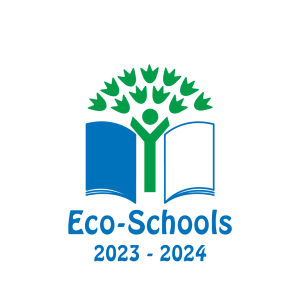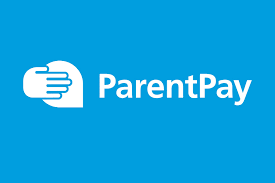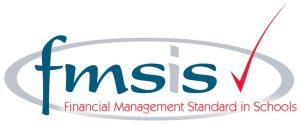Long Term Plan
Nursery have been comparing past and present events in the children’s own lives. The children have also talked about celebrations within our Nursery group.
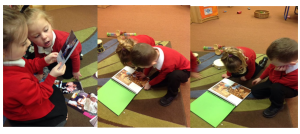
In Reception class we use our visual timetable to talk about what we will do next, after lunch and in the afternoon. The children enjoy using our class floor book to record activities using photos and quotes from the children that we can look back and talk about things we have enjoyed in the past. We have a birthday display to show when in the year our birthdays are celebrated.
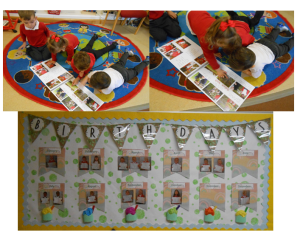
Year 1 have been learning about our own history and have used the words ‘before’ and ‘after’ to sequence events from baby to toddler to child. We learned about simple timelines and had fun discussing our best memories and where they fit on our timelines. We can talk about the great events we celebrate each year and how we celebrate our birthdays. We interviewed Mrs Elmes and Mrs Brown to learn how they celebrated their birthdays as children and to highlight similarities and differences between past and present birthdays. We have decided what objects we would put in our own time capsule.
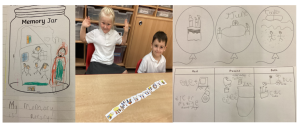
Year 2 have been learning about schools in the past. We have compared how schools were within 1900s to what they are like now. We have created a timeline of how schools have changed through living memory and explored our school grounds to see the features of our building. We have compared periods of time and how features of the school day were the same or different and finally discussed and have drawn which period of time we would prefer to be at school.
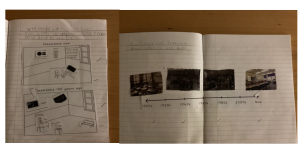
Year 3 have been learning about the Vikings. We investigated different sources of information to find out where the Vikings came from and why they came to Britain. We found out how longboats were built and created our own. Using artefacts, we made inferences about how the Vikings lived and explained whether they were traders, raiders or settlers.
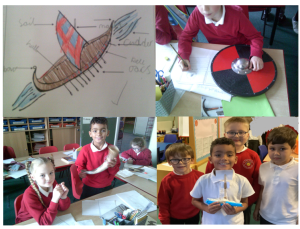
Year 4 have enjoyed investigating the changes in children’s lives through time. The children learnt how children’s spare time, health and work have changed. The children explored the most crucial change, the working lives of children. One of the children was in the hot seat being a glover in the Tudor time, the children read extracts from the Victorian Era of the different working conditions. They were most impressed by the impact of the work of Lord Shaftesbury and he introduced Ragged Schools.
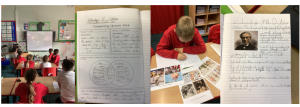
Year 5 have been looking at what life was like in Tudor England. We looked at different sources of information to decide if Henry VIII was a tyrant or fair; made deductions about Anne Boleyn and looked closer at Henry’s criteria for a wife and then we looked at the Royal Progress and what it was like at the time.
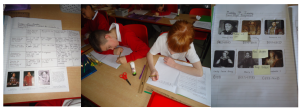
Year 6 have been learning…’What does the census tell us about our local area?’ Children have used the census to extract information, looked at photographs and maps and used their inference skills to build pictures of what is was like to live in the past.
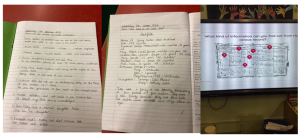
Intent
What is taught?
We recognise the importance of History in understanding how it has shaped and altered our lives and the area we live in. As one of the foundation subjects taught in primary school we give the learning of History the prominence it requires.
We follow the National Curriculum for History which aims to ensure that all children:
- know and understand the history of these islands as a coherent, chronological narrative, from the earliest times to the present day: how people’s lives have shaped this nation and how Britain has influenced and been influenced by the wider world
- know and understand significant aspects of the history of the wider world: the nature of ancient civilisations; the expansion and dissolution of empires; characteristic features of past non-European societies; achievements and follies of mankind
- gain and deploy a historically grounded understanding of abstract terms such as ‘empire’, ‘civilisation’, ‘parliament’ and ‘peasantry’
- understand historical concepts such as continuity and change, cause and consequence, similarity, difference and significance, and use them to make connections, draw contrasts, analyse trends, frame historically-valid questions and create their own structured accounts, including written narratives and analyses
- understand the methods of historical enquiry, including how evidence is used rigorously to make historical claims, and discern how and why contrasting arguments and interpretations of the past have been constructed History – key stages 1 and 2 2
- gain historical perspective by placing their growing knowledge into different contexts, understanding the connections between local, regional, national and international history; between cultural, economic, military, political, religious and social history; and between short- and long-term timescales.
We teach history in a way that makes positive and clear links with changes within living memory e.g. the children’s own immediate past looking at their own timeline. This then moves out to the timelines of their parents and Grandparents.
Local, British and World history is studied to include significant local historical events and people. The history of our locality of St Helen Auckland and West Auckland is taught detailing aspects such as the Football World Cup and the role of the Railway and coal mining and quarrying. This is broadened to the history of County Durham, The UK and Europe and then ancient civilizations
We aim to develop children’s interests and curiosity in historical events and people that have shaped their lives today. Questioning and research are key skills to enable children to gain positive attitudes and interest in the subject of history.
Our History Curriculum lends itself to developing the following skills for life (Learning Powers):
- questioning
- research and capitalising
- making links
- noticing
- imagining
- reasoning
- empathy
Implementation
How is History taught in our School?
When teaching history, we see it as essential that there is clear understanding of the chronology of events – this is both with local events and national and global events and periods of time.
In planning for the history curriculum, we have focused on the key vocabulary to be taught linked to the topics covered and the key knowledge the children should know and remember. It is taught in class in ways to encourage children to retain facts, knowledge and skills as they move through school to know more and remember more.
History is taught in a range of ways depending n the links to the topics covered and is planned to be delivered every other half term in:
- blocks and taught for whole class sessions (usually the afternoon) across a few weeks of the half term
- or taught once a week across each week of the half term
History is taught for 3 half terms within the year in each class.
Impact
Why is History taught in this way?
History is taught this way so the children can understand how significant events and people from the past have effected the lives and developments within St Helen Auckland, West Auckland and Bishop Auckland as their immediate localities. This enables the children to have a deep understanding of different civilisations from different periods of time.
Teaching History in this way will allow children to be confident by the end of KS2 when:
- using timelines to show their chronological understanding
- discussing their local history and it’s significance
- making links between National events and how they impacted on the local communities
- understanding the difference between reliable and unreliable sources when researching information
- recalling key knowledge from the topics covered throughout KS1 and KS2
This all prepares the children well for a smooth learning transition in History at KS3
We assess the children’s recall and use of key skills by:
- use of planned key questions at the end of topics
- use of KWL grids at the end of topics
- evaluation grids at the end of each term and year that are passed to the next teacher each year
Medium Term Planning
Year 1 MTP
Year 2 MTP
Year 3 – MTP
Year 4 MTP
Year 5 MTP
Year 6 MTP
Long Term Planning

